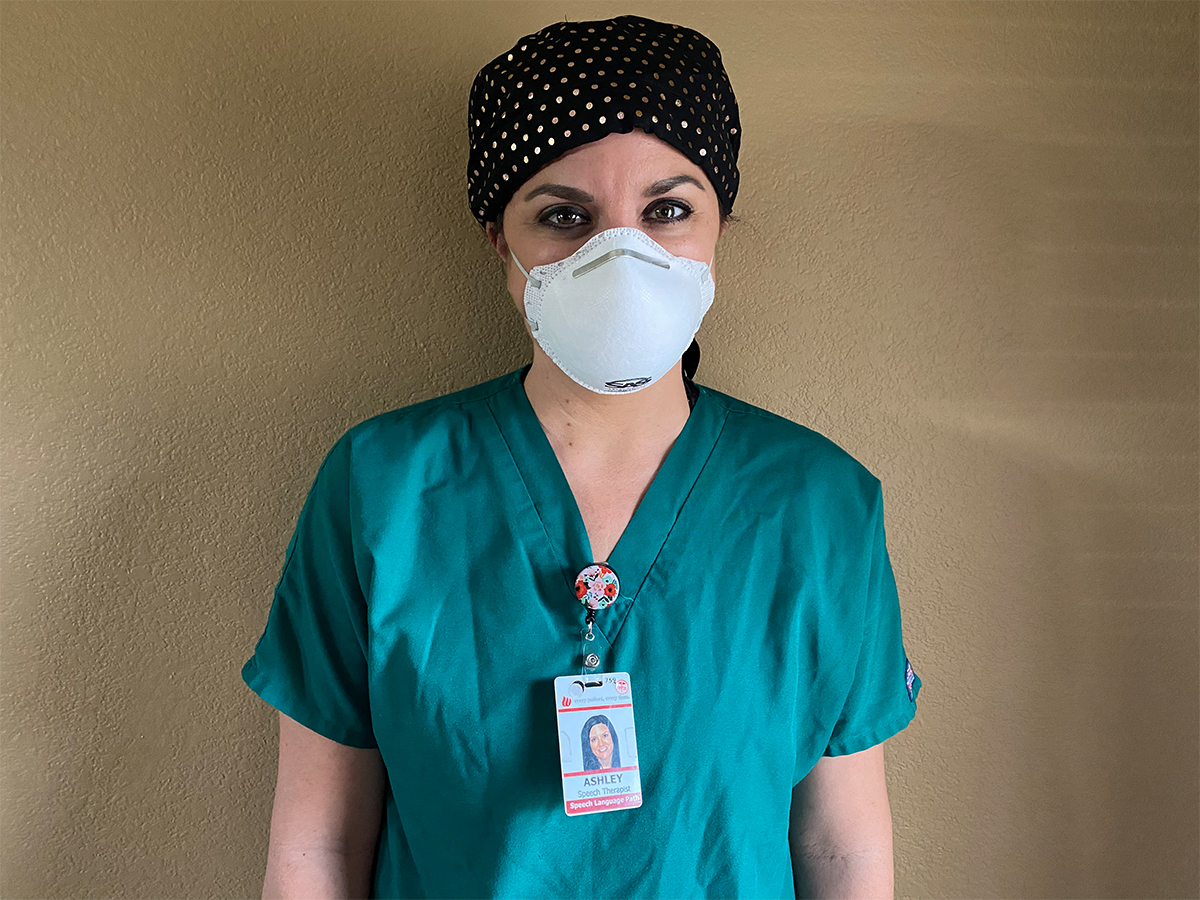As businesses begin to reopen and more people venture outside their homes, health care workers continue to stay vigilant against the threat of COVID-19.
Ashley Purdum, an associate clinical professor at Wichita State University, works as an acute care speech-language pathologist (SLP) at Wesley Medical Center. As a SLP, Ashley evaluates and treats patients of all ages in the areas of speech, swallowing, language and cognitive deficits and voice disorders. She typically sees patients dealing with a stroke, traumatic brain injury, spinal cord injury, neurogenic disease or general debilitation.
Right now, Wesley has one SLP dedicated to helping patients with COVID-19 and those suspected to have the virus. This helps to reduce patient exposure and excessive use of personal protective equipment (PPE).
Even though Ashley does not directly interact with the COVID-19 patients, she still takes the use of her PPE seriously to protect herself and her patients.
“I have always been careful about proper use of PPE, but it is obviously at the forefront of everyone’s minds right now,” Ashley said.
All employees at Wesley must get their temperature checked each day before entering the hospital. They are then given one mask to use for the day that they must keep on for the entirety of their shifts. In an effort to further limit the spread of COVID-19, the hospital has opened a mini-market for employees so they can shop for essentials away from the general public.
In light of all the changes, Ashley remains optimistic and applauds those working in the health care field.
“I have an entire new appreciation for the colleagues I see working so hard and risking their lives to keep our community safe,” Ashley said. “It’s a humbling experience.”
Because nonessential procedures have been cancelled, Ashley is seeing fewer patients than normal. However, she has had to significantly adjust the way she interacts with the patients she does treat.
Many of the patients Ashely works with are confused and worried about their diagnosis and what it means for them, making the inclusion of PPE scary and intimidating. In addition, the major restriction on visitors often means patients are alone. Because of this, Ashley has had to change the way she interacts with patients.
“I’ve learned to be more expressive with my eyes and to sometimes just hold the patient’s hand and calmly assure them I’m there to help them,” Ashley said.
From a medical perspective, wearing masks makes speech and swallowing therapy difficult. Many patients require modeling to understand what movements they should make, but masks take away the ability to provide the model.
While the way Ashley works has shifted, she says it is not the most substantial transformation she has seen since the beginning of COVID-19.
“The biggest change is the anxiety of not only myself and my colleagues, but our patients,” Ashley said.
Ashley, like most health care workers, has a fear of bringing the virus home to her family. She also worries about her patients because most of them are vulnerable and at a higher risk for having negative outcomes if they were to contract COVID-19.
“They’re counting on all of us to keep them safe, and with that come a large sense of responsibility to advocate for them,” Ashley said.
Despite this anxiety, Ashley has found a silver lining.
“There’s been good change, too,” Ashley said. “There’s an overwhelming and unspoken sense of support among health care providers. You can feel that on the job, and I hope that part stays because it’s been inspiring to see.”
For those who need medical assistance and might be worried about getting treated, Ashley had some encouraging words: “Your safety is truly the first priority of every provider I know. Yes, it’s a stressful and scary time, but we are ready to meet your needs while keeping us both safe.”


 Courtesy
Courtesy